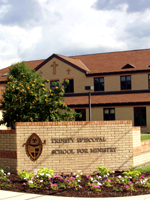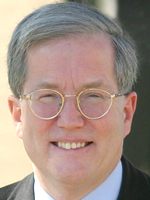 |
| Trinity Episcopal School for Ministry (PHOTO BY TRINITY EPISCOPAL SCHOOL FOR MINISTRY) |
Trinity Episcopal School for Ministry occupies a small campus in Ambridge, Pennsylvania — an industrial town on the Ohio River. The seminary was founded in 1976 by charismatic and evangelical members of the Episcopal Church, which is part of the worldwide Anglican Communion. (“Episcopalian” and “Anglican” are often used as synonyms in the United States.) Trinity has never tried to build an endowment, instead relying on tuition and small donations from individuals and churches for most of its funding.
In Trust spoke to the Very Rev. Paul F. M. Zahl, dean-president of the school, about Trinity’s financial philosophy.
When Trinity School for Ministry first started, what was the philosophy of the founders about raising support for the school?
 |
| Paul F.M. Zahl |
The philosophy of the founders came from the founding principles of the Church Missionary Society, which was an evangelical Anglican mission that started in the very early 19th century. These principles have quite a long pedigree, and they came to Trinity specifically through one man — the founding dean-president, the Right Rev. Alfred J. Stanway — a former missionary bishop in what was then called Tanganyika [now Tanzania]. He came and said that the founding principles of the school were four, and one of them related to money: “Always put money in a secondary position.”
“God’s work” — these are his words — “God’s work done in God’s way will never suffer for lack of provision.”
Bishop Stanway brought these principles and set a tremendous stamp on the school by seeing that these principles became part of the approach to money at the school. Basically it’s the philosophy that “faith missions” have. You should never go beyond the money that you’re given. Constantly be in prayer for money to do what you believe, and if you don’t receive the money to do something, that is a way of being told that you’re not supposed to do it.
Therefore money is entirely on a weekly, daily, monthly basis, and at the furthest it’s an annual fund. This means that we are constantly — four times a year at least, maybe six sometimes — going to our donor base and asking them to give again. This means that we don’t have pledging. We don’t have any kind of regular system for collecting people’s contributions or for people to say, I plan to give such-and-such over a long period of time.
So we’re entirely at the behest of the generosity of our friends. Individuals are the vast majority of the giving, most of it rather small in absolute terms, sometimes big but usually quite small gifts — but they add up. And we also have a large number, but not a huge number, of parish churches that will send us $2,000 a year or $5,000 a year. Although a great many of the gifts that we get from parishes go to scholarship money. This means we have no rainy-day fund, we have no safety net of any kind. In fact, we have no endowment.
It seems to me that the big decisions about the way that support is raised are really board decisions.
They are, but the board has very much accepted Bishop Stanway’s governing principle. They’ve never gone back on that. It’s in all our literature, it’s in our bylaws.




























